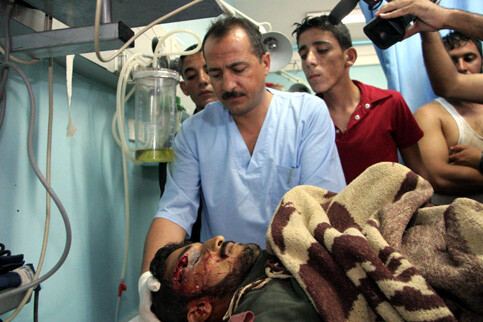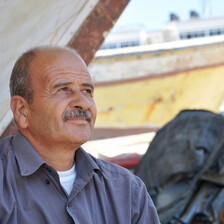The Electronic Intifada 8 December 2008

A Palestinian doctor tries to treats fisherman Hani al-Najar, 27, who later died of his wounds after Israeli forces shot him off of the Gaza coast, October 2006. (Hatem Omar/MaanImages)
RAMALLAH, West Bank (IPS) - Israeli naval commandos recently hauled off three international peace activists off Palestinian fishing boats seven nautical miles off Gaza’s coast. They were accompanying 15 Palestinian fishermen attempting to complete a day’s fishing without being shot at or arrested by the Israeli navy.
Darlene Wallach (57) from the US, Andrew Muncie (34) from Britain and Italian Vittorio Arrigoni (33), members of the International Solidarity Movement (ISM), a pro-Palestinian rights organization, were attempting to protect the fishermen when their three boats were surrounded by two Israeli gun boats and five smaller naval boats.
Twenty naval commandos boarded the vessels. Using tasers and guns, they forced the ISM members and Palestinian fishermen into their naval vessels. Despite being in Palestinian territorial waters, and nowhere near Israeli territorial waters, the solidarity activists were taken to a detention center at Ben Gurion International Airport in Tel Aviv from where they were subsequently deported. The Gazans were interrogated before being sent back to Gaza.
The activists had been accompanying Gaza’s fishermen on daily fishing expeditions for the last few months as the fishermen played a game of cat and mouse with the Israeli navy, risking their lives and property in their attempt to eke out a living.
Under the Oslo Accords signed in 1994, Gaza’s fishermen were permitted to go 20 nautical miles out to sea. Following the outbreak of the second Palestinian uprising, or intifada, in 2000, the capture of an Israeli soldier and the takeover of the territory by the Islamic resistance organization Hamas, Israel limited this to six nautical miles on grounds of security.
Three Palestinian fishermen were shot dead over the last two years as they strayed past the Israeli limit, but even those within the limit have been shot at. Numerous others have been injured, had their boats confiscated, and returned with essential equipment missing.
Israeli human rights organization B’Tselem has said in a report that the Israeli navy has also humiliated and abused many of the fishermen captured.
“Usually, the Israeli soldiers shoot at and around our boat with automatic weapons, and they shoot a high-pressure water cannon at the boat,” said Khaled al-Habeel, one of the fishermen captured with the international activists. “When they arrest us, they make us strip down to our underwear, jump into the water even in winter, and swim to their ship where we are then arrested, handcuffed, and taken away to an Israeli interrogation center.”
The United Nations estimates that a distance of 12-15 nautical miles off Gaza is the minimum required to access the larger shoals of fish for maximum economic benefit.
Due to over-fishing in shallow waters, the stocks of smaller fish closer to shore have almost been depleted without having the chance to reproduce. The more lucrative shoals of tuna are also found further out.
The cost of one fishing trip can vary between 125 and 625 dollars, depending on the size of the vessel, nets and crew, and many fishermen cannot cover their costs from the resulting catch. They have no option but to remain on shore.
Collectively, Palestinian fishermen saw their monthly catch drop from 823 tons in June 2000 to as low as 50 tons in late 2006, according to the UN.
At the end of the 1990s, Gaza’s fishing industry was worth about 10 million dollars annually, and represented four percent of the Palestinian gross domestic product. Some of the fish was exported, while the rest sustained the local market.
Between 2001 and 2006 this income was almost halved. Today, impoverished and unemployed Gazans, suffering malnutrition and without access to adequate medical supplies, are forced to import fish from Israel.
“The market is hungry for fish but the amount of fish caught is not enough to feed the people,” said Finn Ebbesen of the Danish International Development Assistance (DANIDA), which has been working in Gaza for nearly a decade.
“This is a category of people who have lost everything and are very food insecure,” says Jean-Luc Siblot, former head of the UN World Food Program’s (WFP) operations in the Palestinian territories.
To help the fishermen cope, WFP along with its implementing partner, DANIDA, started food-for-work and food-for-training projects several years ago to support some 1,470 fishermen households, or 8,820 people who were most affected by the ongoing conflict.
“What is most important is for households to find other ways to make a living which will cushion them against the effects of the humanitarian crisis they are facing,” said Siblot. “By providing food aid, WFP is trying to help them do this.”
In exchange for maintaining the upkeep of their boats and nets, the Gazan fishermen are given monthly WFP food rations of wheat flour, sugar, olive oil and lentils.
However, Israel has enforced an embargo on Gaza, sealing the borders since Hamas took over in June 2007 (after winning the elections in 2006), opening them only periodically to allow minimum amounts of humanitarian aid on a spasmodic basis.
For the last few weeks there has been an almost total closure, with the borders only opened occasionally for a few hours at a time. This has seriously limited the amount of humanitarian aid that can get in, thereby crippling even the aid projects aimed at helping Gazans to survive.
All rights reserved, IPS - Inter Press Service (2008). Total or partial publication, retransmission or sale forbidden.
Related Links




